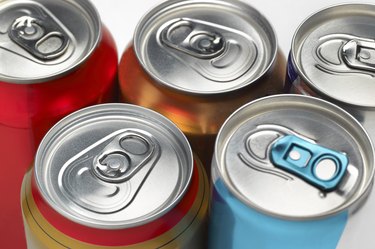
When comparing Rockstar versus Monster to determine which will give you more energy, look at the component of the beverages that provide a perk-up: caffeine. As it turns out, there is the same amount of caffeine in Rockstar and Monster and they will likely have the same energizing effect.
Tip
There is the same amount of caffeine in Rockstar and Monster — around 160 milligrams per can — meaning they're likely to give you the same burst of energy.
Video of the Day
Energy Drinks and Caffeine Content
The amount of energy that a beverage will provide depends on its caffeine content. Monster Energy has 160 milligrams of caffeine per 16-ounce can, according to the company's website, while the caffeine in Rockstar Energy Drink is around 158 milligrams of caffeine per 16-ounce can, according to the USDA. However, the company also produces Rockstar XDurance, which contains 300 milligrams of caffeine per can, and Rockstar Hardcore, which has 240 milligrams of caffeine per can, according to the website. For comparison's sake, an 8-ounce cup of brewed coffee has around 95 milligrams of caffeine, as per the USDA.
Video of the Day
The caffeine in Rockstar and Monster perks you up by stimulating your central nervous system. Its effects can begin within 15 minutes of consuming the plant compound, according to the University of Michigan, and lasts up to six hours. A moderate amount of caffeine is perfectly healthy, but consuming too much might cause unpleasant side effects, such as a high heart rate, dizziness, irritability and insomnia. The Mayo Clinic notes that up to 400 milligrams a day seems to be perfectly safe for a healthy adult, though children and adolescents, as well as pregnant or breastfeeding women, should avoid consuming too much caffeine.
Read more: Long-Term Effects of Caffeine
Energy Drinks and Vitamin B12
Both Rockstar and Monster also contain vitamin B12, a micronutrient that some claim increases energy or improves athletic performance. Monster has 6 micrograms, or 100 percent of the daily value, of vitamin B12 in each 8-ounce serving, says the USDA, while Rockstar contains 15 micrograms of B-12 in an 8-ounce serving.
People who have a vitamin B12 deficiency typically feel an extreme lack of energy, and consuming the micronutrient can perk them up. However, according to the National Institutes of Health, there's no evidence that shows that vitamin B12 improves energy or athletic performance in anyone who doesn't already have a vitamin B12 deficiency. Between 1.5 and 15 percent of Americans experience a deficiency, but it can only be diagnosed by testing your levels via bloodwork.
Sugar in Energy Drinks
The sugar in energy drinks such as Rockstar and Monster is a mixed bag. It's true that when you consume sugar, a type of carbohydrate, it enters the bloodstream, and your body uses it for energy, notes Harvard T.H. Chan School of Public Health. When reviewing Rockstar versus Monster in terms of sugar, they're only slightly different. Monster has 23 grams of sugar per 8-ounce serving — or half a can — while Rockstar contains 29.4 grams of sugar per 8 ounces, according to the USDA.
However, the concept of a sugar rush just might be a myth. A study published in June 2019 in Neuroscience & Biobehavioral Reviews determined that consuming carbs, such as sugar, increases fatigue within 30 minutes and lowers alertness within 60 minutes. Therefore, if you're looking for a pick-me-up, it might be a better idea to consume caffeine without any extra sugar, such as in the form of coffee or tea, rather than in an energy drink.
Read more: The Effect of Refined Sugar on the Body
- University of Michigan: "Caffeine"
- National Institutes of Health: "Vitamin B12"
- USDA: "Beverages, Coffee, Brewed, Prepared with Tap Water"
- Mayo Clinic: "Caffeine: How Much Is Too Much?"
- Harvard T.H. Chan School of Public Health: "Carbohydrates and Blood Sugar"
- Neuroscience & Biobehavioral Reviews: "Sugar Rush or Sugar Crash? A Meta-Analysis of Carbohydrate Effects on Mood"
- USDA: "Beverages, Energy Drink, ROCKSTAR"
- USDA: "Monster Energy Drink"
- Monster Energy: "Products"
- Rockstar Energy Drink: "Products"